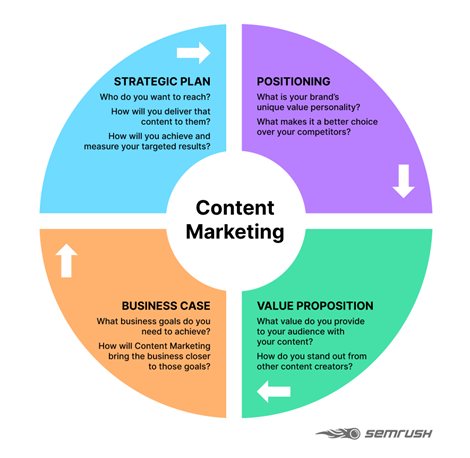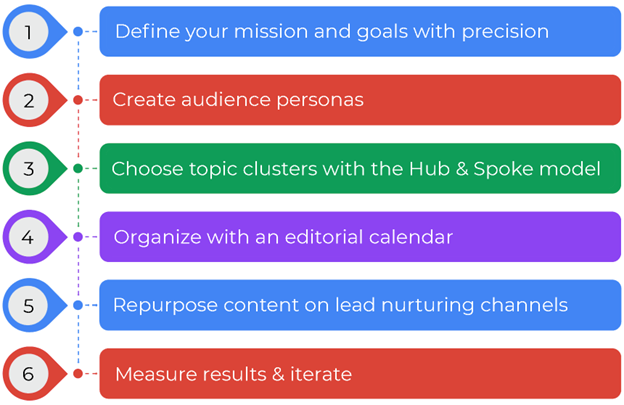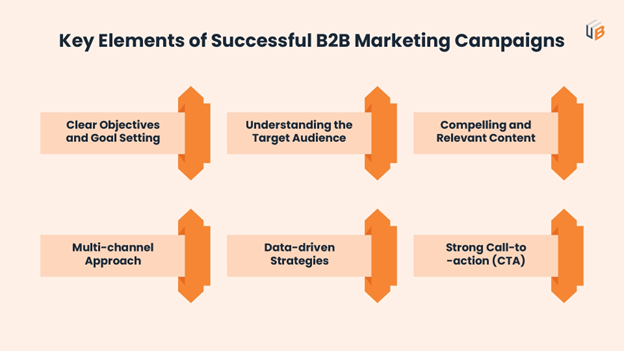SHARE

In the world of B2B marketing, content creation plays a crucial role in attracting and converting leads. Effective content can educate, engage, and ultimately persuade potential buyers to choose your products or services. However, understanding the importance of content creation in the B2B landscape is the first step towards unlocking its potential.

Understanding the Importance of Content Creation in B2B Marketing
Content is the driving force behind lead generation in B2B marketing. It serves as a powerful tool to capture the attention of your target audience and nurture them through the buyer’s journey. By offering informative and valuable content, you can establish yourself as a trusted authority in your industry and develop a strong relationship with your potential customers.
Creating compelling content requires a deep understanding of your target audience’s pain points and challenges. It’s not just about creating generic content; it’s about crafting content that resonates with your audience and provides them with solutions to their specific problems.
The Role of Content in Lead Generation
In lead generation, content serves as the driving force propelling the engine forward. Consistently creating top-notch content is the key to drawing potential leads to your website or landing pages. Whether through blog posts, white papers, or webinars, your content should offer valuable insights and solutions to your target audience’s inquiries. Consider a scenario where a potential buyer seeks a solution to a complex problem.
They discover your blog post, which not only delves into the intricacies of the issue but also provides practical tips and strategies to overcome it. This valuable content captures their attention, establishing you as a thought leader in your industry. Incorporate lead capture forms or call-to-action buttons within your content to further leverage this engagement. This strategic approach allows you to convert these visitors into leads, enabling you to nurture and guide them toward making informed purchasing decisions.
How Content Influences B2B Buying Decisions
In the B2B world, buying decisions are often complex and involve multiple stakeholders. Content plays a crucial role in influencing these decisions by providing the necessary information and addressing the concerns of potential buyers.
Let’s say a company is in the process of evaluating different software solutions for their business. They are looking for a provider that not only offers a reliable product but also understands their unique requirements. By creating content that showcases your expertise and understanding of their challenges, you can build trust and credibility, making it more likely for them to choose your solution over competitors.
Content can take various forms, such as case studies, customer testimonials, or comparison guides. These types of content provide real-life examples and evidence of your ability to deliver results. They help potential buyers visualise how your product or service can solve their problems and meet their specific needs.
Moreover, content can also address common objections or concerns that potential buyers may have. By proactively addressing these concerns through your content, you can alleviate any doubts and build confidence in your offering.
Content creation is a fundamental aspect of B2B marketing. It not only drives lead generation but also influences buying decisions. By consistently delivering valuable and relevant content, you can position yourself as a trusted authority and guide potential customers towards choosing your solution.

Defining Your B2B Content Strategy
Before diving into content creation, defining a clear strategy that aligns with your business goals is essential. This involves identifying your target audience and setting specific content objectives. Creating a successful B2B content strategy requires careful planning and consideration. By defining your strategy, you can ensure that your content resonates with your target audience and helps you achieve your business objectives.
Identifying Your Target Audience
Knowing your target audience is essential for creating content that resonates with them. Take the time to understand their needs, pain points, and motivations. This will enable you to tailor your content to address their challenges and provide valuable solutions. When identifying your target audience, it’s important to consider factors such as demographics, industry, job roles, and interests.
By gaining a deep understanding of who your audience is, you can create content that speaks directly to their needs and interests. For example, suppose your target audience consists of small business owners in the technology industry. In that case, you may want to create content that focuses on their challenges in scaling their businesses and provides practical tips on overcoming them.
Setting Clear Content Objectives
What do you want to achieve through your content? Whether it’s brand awareness, lead generation, or thought leadership, setting clear objectives will help guide your content creation efforts. Outline measurable goals and define key performance indicators (KPIs) to track your progress and ensure your content aligns with your marketing objectives. When setting content objectives, it’s important to consider the stage of the buyer’s journey your target audience is in. Are they in the awareness stage, just becoming aware of their challenges? Or are they in the decision stage, evaluating different solutions?
You can create content that guides your audience through each stage, providing them with the information they need to make informed decisions by aligning your content objectives with the buyer’s journey. For example, to generate leads, you may want to create content that offers valuable resources in exchange for contact information. This can include whitepapers, ebooks, or webinars that provide in-depth insights into industry trends or best practices. Remember, setting clear content objectives is crucial for measuring the success of your content strategy. By regularly tracking your KPIs, you can identify what’s working and needs improvement, allowing you to refine your strategy and create even more impactful content.

Key Elements of Successful B2B Content
Creating successful B2B content involves understanding the key elements that make it valuable and effective in capturing the attention of your target audience:
The Importance of Value-Driven Content
Your content should provide value to your audience by offering insights, solutions, or industry expertise. By focusing on delivering value, you position yourself as a trusted resource and establish credibility with potential buyers. This encourages them to engage with your content and consider your offerings.
Balancing Information and Persuasion in Your Content
While informative content is crucial, incorporating persuasive elements is equally important. Your content should highlight the unique benefits of your products or services and why they are the best choice for your target audience. By balancing information and persuasion, you can educate potential buyers while compelling them to take action.
Types of Content That Attract and Convert B2B Leads
Not all content is created equal when it comes to attracting and converting B2B leads. Here are some effective content types that can help you capture the attention of potential buyers:
Blog Posts and Articles
Regularly publishing blog posts and articles can establish your brand as a thought leader in your industry. Addressing relevant topics and providing valuable insights can attract organic traffic to your website and generate leads.
White Papers and eBooks
White papers and eBooks are powerful tools for lead generation. These in-depth resources dive deep into specific topics and provide comprehensive solutions to your target audience’s challenges. By offering valuable and exclusive content, you can capture contact information in exchange for downloading these resources.
Webinars and Podcasts
Webinars and podcasts are engaging formats that allow you to share your expertise and connect with potential buyers in real-time. These interactive sessions provide an opportunity to showcase your thought leadership and answer questions directly, building trust and credibility.
Optimising Your Content for Lead Conversion
To maximise the impact of your B2B content, optimising it for lead conversion is essential. Here are two crucial strategies:
Incorporating Strong Call-to-Actions
Your content should include clear and compelling calls-to-action (CTAs) that guide potential buyers towards the next step in their journey. Whether it’s subscribing to a newsletter, requesting a demo, or downloading a resource, your CTAs should be persuasive and make it easy for prospects to take action.
Leveraging SEO for Better Visibility
Optimising your content for search engines is crucial for increasing its reach and visibility. Conduct keyword research to understand the terms and phrases your target audience is searching for. Incorporate these keywords naturally into your content and ensure proper formatting and meta-tags to boost your search engine rankings.
By following these strategies and creating valuable content, you can attract and convert leads in the B2B space. Remember, the key is to understand your audience, provide value, and consistently deliver content that meets their needs and resonates with them.
[thrive_leads id=’8325′]
Frequently Asked Questions About Content Creation for B2B
What Is a B2B Content Creator?
B2B content marketing is producing and distributing content to increase brand awareness, traffic, leads and sales for business-to-business companies. Common forms of content marketing in B2B include blogging, podcasting, email newsletters and infographics.
What Makes B2B Content Successful?
Brand positioning should define your company’s values, mission, and competitive advantage. Creating a consistent and unique voice can draw your audience in and keep them interested.
How Do I Start B2B Content Marketing?
What Is a B2B Content Format?
Why Is Content Important in B2B?
Create content that consistently addresses the audience’s interests and needs. You can nurture customer relationships to the point when they are ready to purchase.














